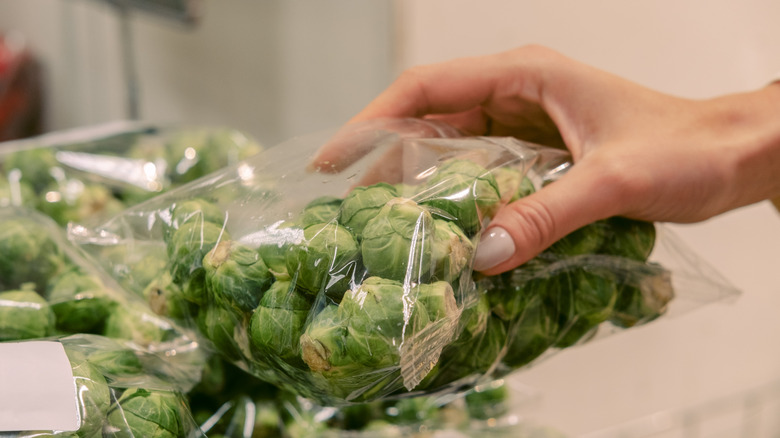One Serving Of This Polarizing Vegetable Has 4 Grams Of Protein And Fiber
Few vegetables have experienced a sudden societal shift from loathing to loving. However, there's one that's enjoying a moment — and that's good if you're trying to increase your intake of protein and fiber with plant-based foods.
A vegetable that historically fueled tons of arguments between parents and kids, Brussels sprouts are becoming foodie and health enthusiast faves. They even nabbed a 58% popularity rating on a YouGov survey. Thanks to some ingenious crop engineering that's removed some of their bitterness, Brussels sprouts now taste better, making it easier to dive into these nutrient-packed farm-grown picks (as well as enjoy the health benefits of eating cruciferous vegetables in general).
And chances are you need all the superfood vegetables you can handle. Only 10% of people living in the United States get the recommended amount of vegetables each day, per the U.S. Centers for Disease Control and Prevention (CDC).
If you can incorporate Brussels sprouts into your veggie rotation, experts say you'll be giving your heart and digestive system a much-needed boost. According to Alexis Law, a registered dietitian at Top Nutrition Coaching: "Brussels sprouts are high in fiber, which is essential for having a healthy gut and aids in digestion." How high, exactly? A full cup of Brussels sprouts will net you approximately 4 grams of fiber.
Keep cholesterol and blood pressure in check
As Law explains, fiber doesn't just make food move through your system more efficiently; it also helps in lowering cholesterol. For instance, a fact sheet from the National Lipid Association says that eating between 5 and 10 grams of soluble fiber (such as the kind you get from Brussels sprouts) can reduce your "bad" low-density lipoprotein (LDL) and total cholesterol by up to 11 points. (By the way, your cholesterol levels mean more than you might think.)
You're also going to get protein from your cup of Brussels sprouts — just under 4 grams. Although Brussels sprouts aren't a complete protein (meaning they don't offer all the essential amino acids your body can't manufacture, which is the difference between incomplete and complete proteins), they're still a decent source of protein.
For example, a 2009 study in the International Journal of Refrigeration showed that Brussels sprouts were particularly rich in the amino acids proline and glutamic acid. Proline is known for protecting the skin; glutamic acid may provide support for regulating blood pressure levels.
Protect against blood clots and support your immune system
The nutritional aspects of Brussels sprouts don't end with fiber and protein. Says Law, Brussels sprouts are "also high in vitamin K and vitamin C." She adds that, together, the vitamins help with blood clotting and immunity. Indeed, a single cup of Brussels sprouts offers 218 micrograms of vitamin K and 96.8 milligrams of vitamin C. That's more than 100% of the daily recommended values for each vitamin for the average adult.
If you've hesitated to jump into the Brussels sprouts renaissance because you're unsure how to cook them, Law has a few suggestions based on her preferred cooking techniques. "I love when Brussels sprouts are cooked in the air fryer because it uses minimal oil but cooks quickly and helps make them crispy," she advises. "Additionally, you can roast Brussels sprouts on a large sheet pan to help prep a good bit at a time. I love a little olive oil, garlic powder and a sprinkle of Parmesan."
You can eat Brussels sprouts raw in a salad; there are also ways to prepare fresh Brussels sprouts (like shaving them) so they're easier to chew and swallow. However, be aware that when you eat uncooked cruciferous vegetables like Brussels sprouts, you may experience stomach discomfort, bloating, and excess gas.


